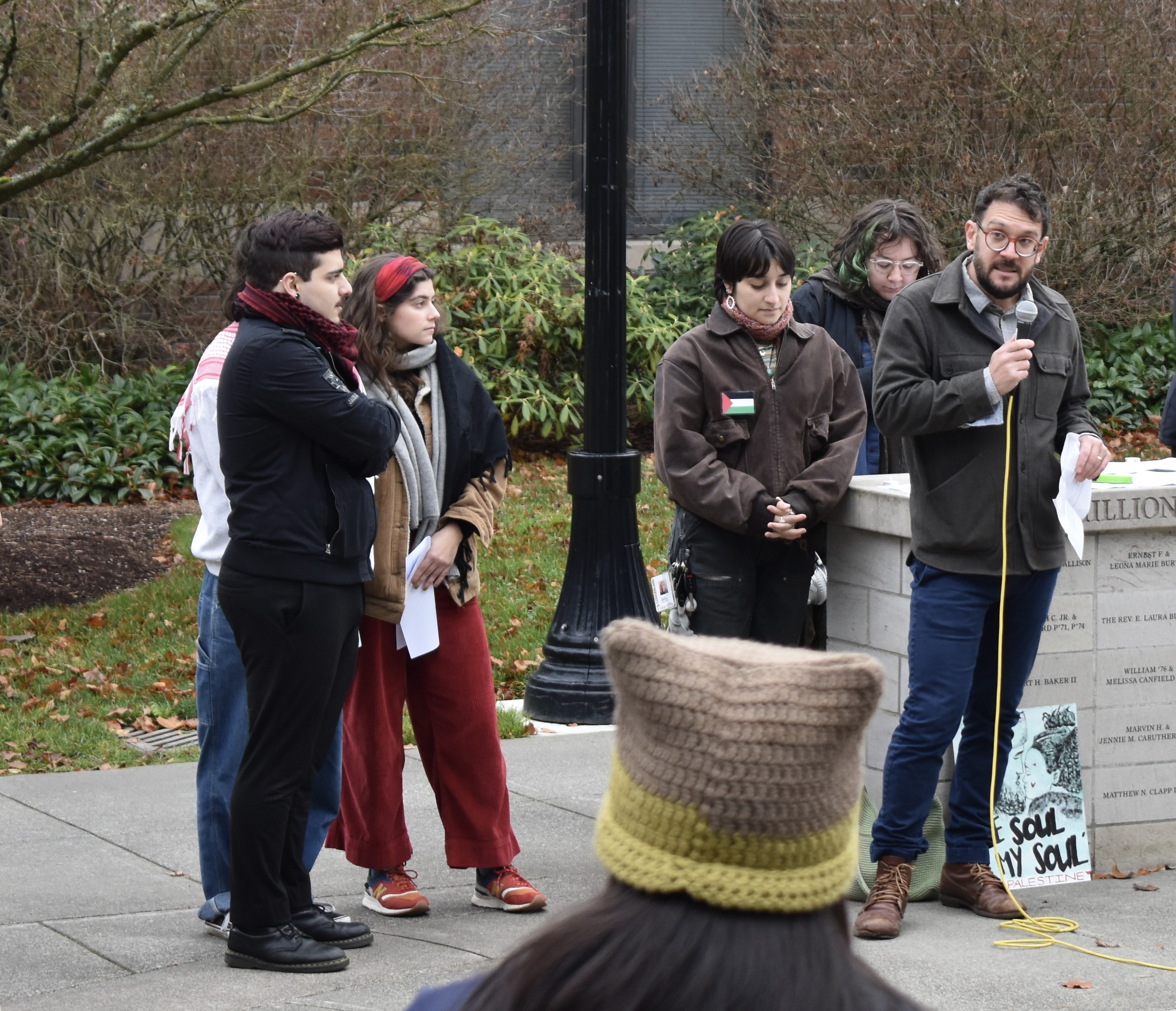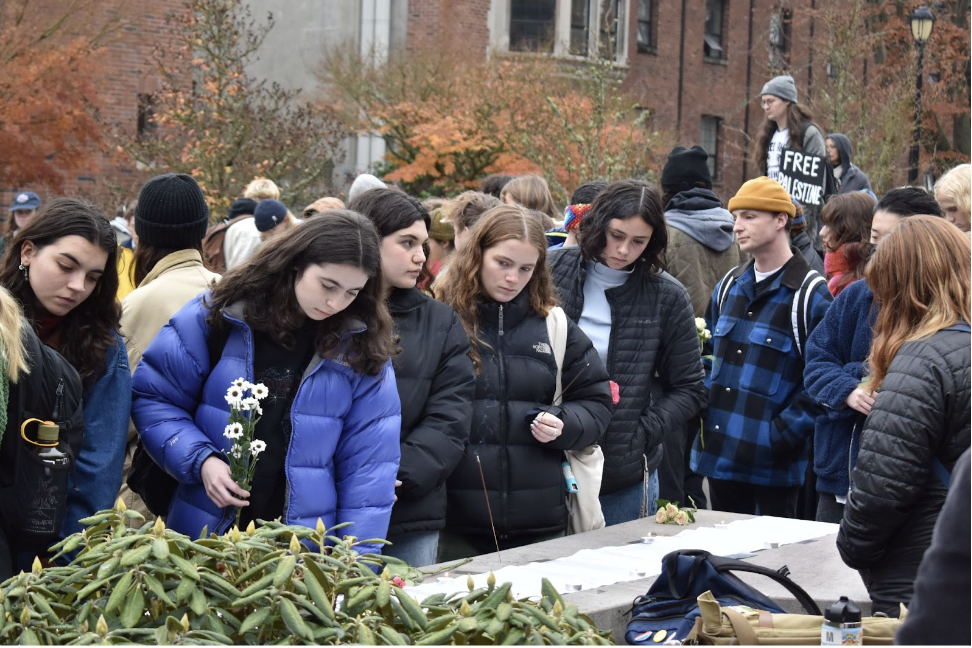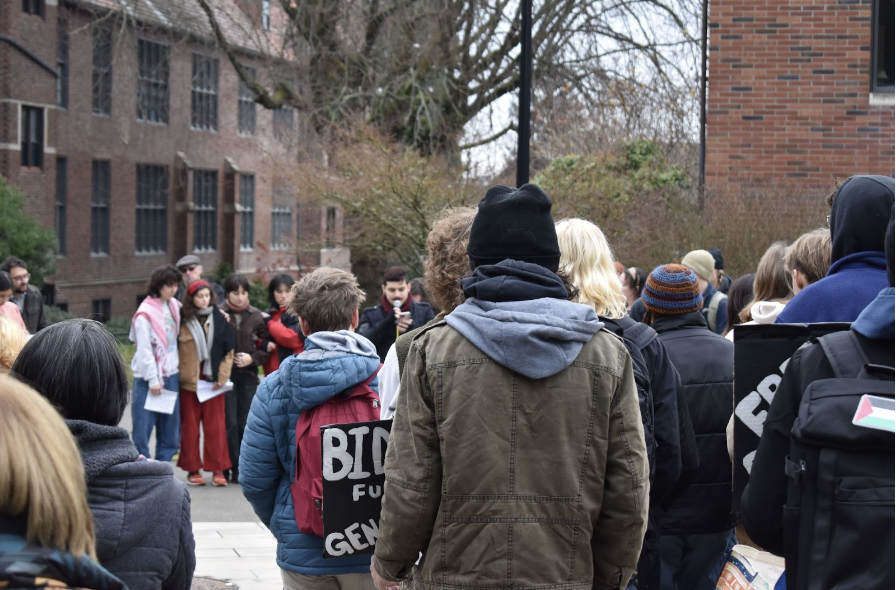
By: Andrew Benoit
A crowd of students, staff, professors and members of the community gathered around Commencement Circle/Benefactor Plaza around noon on Nov. 29 to attend a vigil honoring those who organizers call the Palestinian martyrs, who have died during Israel’s assault on Gaza. The event, organized by the Middle Eastern and North African Student Association (MENA), is one of the first student-organized responses to the war in Gaza on campus and one of the only high-profile responses from the University community as a whole so far.
The tone stayed somber as four speakers – Professor Sam Kigar, Devlyn Habib (‘25), Quinn Shaer (‘23) and Chloe Montoya (‘25) – addressed the crowd with heartfelt personal narratives and calls for increased resistance to the war from the student body, and US citizenry as a whole. Following the speeches, organizers began to read the names and stories of Palestinians killed in Gaza while attendees were encouraged to light incense and place flowers on a list of victims names that covered Commencent Circle. Shaer’s speech captured the simple but powerful explanation for the widespread resistance to Israel’s war: “There is no reason or justification for this mass killing,” she said.
Kigar’s speech was especially notable as the first public statement from a Puget Sound professor against the war in Gaza. So far, discussions on the war from faculty and the University have not taken a strong stance. Kigar explained that his experience in Jewish humanistic tradition, resistance to the U.S. invasions of Iraq and Afghanistan, and his studies as a professor of Islam made it necessary for him to speak out against a war that is killing so many. “My only regret is that it took me so long. But the vigil won’t be the last time I speak out. I hope that other professors join me,” he said.
To Kigar, the lack of response from the University community stems from a fear of the kind of clashes – sometimes violent – that have happened at other universities. “My sense is that many people on our campus have been afraid to go there. I have been afraid. But I needed a chance to mourn and to think; and I’m very grateful that MENA gave me this chance. I am no longer afraid to engage in critical discourse and sometimes difficult disagreement. That is what we are supposed to do at Universities,” Kigar said.
Habib explained that it was important to MENA to finally “end the silence on campus,” and expressed how disappointed he was with the lack of campus response as a whole. “Frankly, the lack of acknowledgement has been extremely disheartening to all of us Middle Eastern students on campus,” she said.
Some students expressed concern and confusion over the use of the term “martyrs.” Kigar addressed the use of the term in his speech, in which he shared a deep grief for the lives that have been lost. He clarified that the English word “martyr” refers to the Arabic word “witness”. Specifically, martyrs in this context are witnesses to the oneness of God.
“It is the same word Muslims say in the Shahada – the witnessing to faith – when they say ‘I bear witness that there is no god but God.’ Muslims believe that means ‘do not mistake others — not another human, not a state, nothing else — for God,’” Kigar told The Trail. “So when Palestinians speak of martyrs, they mean those who bear witness to God’s ultimate sovereignty in the universe. They mean to mourn those innocent lives lost under occupation; they include non-Muslims in this.”
Devlyn Habib’s speech touched on how important it was to honor the victims as martyrs. He elaborated in a comment to The Trail. “Their deaths will never be in vain. We will do everything we can to always remember them as they were in life, and never let their memory fade,” he said.
Habib added that negative reactions to the term likely stem from a lack of knowledge. “Any misunderstanding comes from a fundamental ignorance of the history of the word and its cultural significance, likely due to western media influence,” she said.
Shaer, who is a recent graduate from the University, used part of her speech to criticize the American penchant for pleasure as a means of escaping the bleak realities of living in what she described as “the imperial core.” She urged attendees to shake off the cycles of avoidance and to engage in struggle and resistance.
While Habib emphasized that he has appreciated the material support the University has provided MENA, he was disappointed by the lack of solidarity from the University. So far, the University – like most institutions of higher education – has refrained from making comments supporting any cause. “The one thing we’ve truly wanted is acknowledgement and for the university to finally make a statement and take a stand, rather than the politically neutral stance they’ve taken thus far,” said Habib.
Shaer spoke about the importance of the community that MENA had provided her for getting through this period. MENA members hugged and comforted each other throughout the vigil, as did some attendees. Habib also expressed how difficult watching what is happening has been. “I’m ashamed I’m not there with you, my brothers and sisters, dying alongside you,” she said.



